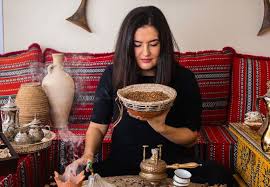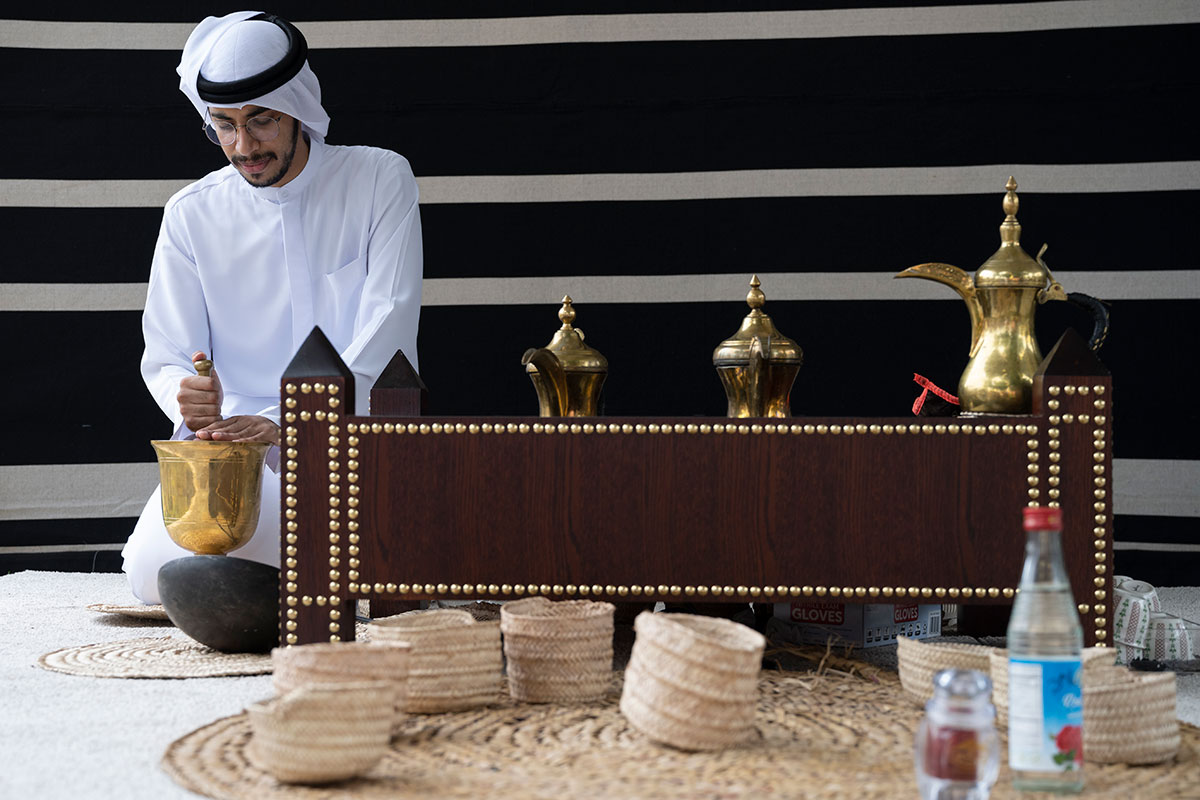In the heart of Oman, where traditions are woven into the rhythm of daily life, coffee is more than just a drink. It is a cultural symbol, a ritual, and a bridge that connects people across generations and communities. Known as qahwa in Arabic, Omani coffee is prepared with unique spices and served with dates, creating an experience that transcends taste. To the Omani people, coffee reflects hospitality, unity, and respect. In fact, the coffee pot placed at the center of any gathering is a symbol of warmth and openness, inviting conversation and strengthening relationships. This article explores how Omani coffee culture has evolved into a cherished tradition that brings people together and continues to inspire belonging in an ever-changing world.
A Symbol of Omani Hospitality
Hospitality is a cornerstone of Omani identity, and coffee sits at the very center of this tradition. When a guest enters an Omani home, the host greets them with a pot of freshly brewed coffee, served in small cups. It is a gesture of honor, a way to say, “You are welcome, and you belong here.” Refusing a cup is rare, as it can be seen as a rejection of the host’s goodwill. This simple act creates an instant bond between host and guest, reflecting values of generosity and respect.
Coffee in Oman is not hurried. It is served slowly, with grace, and often accompanied by stories, laughter, and deep conversations. The ritual teaches patience, showing that hospitality is not about rushing but about giving time and attention. For visitors, it offers a glimpse into Omani culture, where relationships are nurtured over shared cups of coffee rather than fleeting exchanges.
The Unique Taste of Omani Coffee
Omani coffee is distinct from its regional counterparts. Unlike the strong, dark brews found elsewhere in the Middle East, Omani coffee is lighter, often flavored with cardamom, saffron, rosewater, or cloves. This fragrant blend creates a delicate balance of flavors, offering warmth without heaviness. The choice of spices reflects both Omani creativity and the nation’s history as a hub of trade along the ancient spice routes.
Served in small handle-less cups called finjaan, Omani coffee is enjoyed in modest quantities but repeated rounds. Each cup invites connection, as the host continues pouring until the guest signals they’ve had enough. This tradition highlights not only the drink’s unique taste but also its role as a tool for social bonding.

Coffee and Social Gatherings
In Omani society, coffee is inseparable from gatherings, whether formal or informal. Weddings, religious celebrations, community meetings, and even casual visits all feature coffee at their heart. Its presence signals joy, respect, and togetherness. Sharing coffee turns any occasion into a communal experience, where differences fade and connections grow stronger.
One of the most beautiful aspects of this culture is its inclusiveness. Around the coffee pot, age, status, and background lose significance. Elders share wisdom, youth contribute energy, and everyone partakes in the same ritual. Conversations flow more naturally, and even disagreements find softer ground when shared over cups of steaming coffee.
The Role of Dates in Coffee Culture
Coffee in Oman is almost always paired with dates, which symbolize prosperity and life. The sweetness of dates balances the bitterness of the coffee, creating harmony in every sip and bite. This pairing also reflects Omani values of balance and unitl two distinct flavors coming together to form a perfect match. Offering coffee with dates is a sign of respect and care, ensuring that the guest’s experience is complete and fulfilling.
The ritual of serving dates alongside coffee is also deeply symbolic. Dates are seen as nourishment, while coffee is a stimulant for the mind and spirit. Together, they reflect Omani generosity, ensuring that guests are cared for both physically and emotionally.
Coffee as a Bridge Between Generations
One of the most remarkable aspects of Omani coffee culture is its ability to bridge generations. In many homes, the tradition of preparing and serving coffee is passed down from grandparents to grandchildren. Young people learn not only the recipe but also the values of patience, respect, and hospitality that come with it.
The act of brewing coffee becomes a living lesson in cultural identity. Children who may be growing up in a modern, fast-paced world are reminded of their roots through the aroma of cardamom and saffron rising from the pot. These shared experiences connect the past with the present, ensuring that Omani traditions remain alive and meaningful.
Coffee in Modern Omani Society
Even as Oman embraces modernization and global influences, coffee remains a powerful symbol of continuity. Coffee shops have sprung up across cities like Muscat, where young people gather to socialize, study, or simply enjoy a break. Yet, even in these modern settings, traditional Omani coffee holds its place alongside international blends.
This blend of old and new highlights how Omani culture adapts while preserving its essence. A group of friends may order cappuccinos, but they will often share a pot of qahwa too, honoring their heritage while engaging with global trends. The coffee culture remains a unifying factor, reminding Omanis of their shared identity in a rapidly changing world.
Coffee as a Tool for Diplomacy
Beyond households and communities, Omani coffee has also found a place in diplomacy. It is often served during official meetings, both within the country and in international contexts. The ritual of serving coffee symbolizes goodwill, openness, and a desire for constructive dialogue.
This tradition allows Oman to share its culture with the world, using coffee as a gesture of peace and respect. In this way, the drink transcends social gatherings and becomes a symbol of Omani values on the global stage.
The Spiritual Side of Coffee
For many Omanis, coffee is more than a social or cultural practice it also holds a spiritual dimension. The act of preparing coffee is often meditative, requiring focus and patience. The careful blending of spices, the slow pouring into cups, and the shared silence during the first sip all create a sense of mindfulness.
Coffee can also serve as a pause in daily life, offering space for reflection and gratitude. It teaches people to slow down, to savor the moment, and to connect with others in a meaningful way. This spiritual aspect makes Omani coffee not only a drink but also a practice of presence and awareness.

Women and Coffee Traditions
In many Omani households, women play a central role in preparing and serving coffee. This responsibility is both practical and symbolic, as it reflects their role in maintaining family traditions and hospitality. Through coffee, women pass down not only recipes but also cultural values, ensuring that future generations remain connected to their roots.
Today, Omani women also play a role in modern coffee culture, leading businesses, opening coffee shops, and contributing to the evolution of the tradition. Their influence ensures that coffee remains both a cultural anchor and a space for innovation.
Coffee and Tourism in Oman
As Oman opens its doors to more visitors, coffee has become an important part of the tourism experience. Travelers are often invited to experience traditional coffee ceremonies, where they learn about the preparation, flavors, and meanings behind the ritual. For many, this becomes a highlight of their journey, offering a window into the warmth and generosity of Omani society.
Coffee tourism not only boosts the economy but also strengthens cultural pride. By sharing their coffee traditions with the world, Omanis reinforce their identity while fostering cross-cultural understanding.
Coffee as a Reflection of Identity
Ultimately, Omani coffee is more than just a beverage. It is a reflection of who the Omani people are: generous, respectful, inclusive, and deeply rooted in tradition. Every cup tells a story of history, trade, family, and community. Every serving carries the weight of hospitality and the lightness of friendship.
For Omanis, coffee is not optional it is essential. It defines gatherings, guides conversations, and marks life’s milestones. It is a daily reminder that people are stronger together and that simple rituals can hold profound meaning.
Conclusion
The culture of Omani coffee is a living tradition that continues to bring people together in meaningful ways. From family gatherings to diplomatic meetings, from ancient homes to modern cafés, coffee serves as a thread that weaves the social fabric of Oman. It represents hospitality, unity, and respect, values that are deeply cherished by the Omani people.
As the world grows faster and more digital, Omani coffee culture offers an important lesson: human connection thrives in shared experiences. A small cup of coffee, served with sincerity, can bridge divides, heal differences, and inspire lasting bonds. In this way, Omani coffee is not just a drink it is a celebration of togetherness, a ritual of peace, and a timeless symbol of belonging.
Also Read – Breaking Barriers: How Oman Empowers Women in Technology



